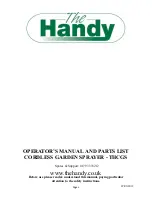
11
6. TROUBLESHOOTING
Spray pattern diagnosis
Problem
Possible Causes
Likely Solutions
Heavy center
pattern
1. Pattern Knob partially closed.
2. The paint is too thick.
3. The air pressure is too low.
1. Open Pattern Knob more.
2. Thin paint according to the manufacturer's
instructions.
3. Increase air pressure within the Operating
Air Pressure.
Light center
pattern
1. High air pressure.
2. Fluid Knob not open enough.
3. Pattern Knob open too far.
1. Reduce air pressure.
2. Open Fluid Knob.
3. Partially close Pattern Knob.
Heavy top/
bottom pattern
1. Nozzle plugged.
2. Nozzle loose or dirty seal.
3. Dried paint on Fluid Tip.
4. Damaged Fluid Needle.
1. Clean Nozzle.
2. Clean and tighten Nozzle and seal.
3. Use a nonmetallic point to clean Fluid Tip.
4. Replace Fluid Needle and Fluid Tip.
Pattern on right
or left only
1. Dirt on one side of Fluid Tip.
2. Holes on one side of
Nozzle are plugged.
3. Damaged Fluid Needle.
1. Use a nonmetallic point
to clean Fluid Tip.
2. Use a nonmetallic point
to clean Nozzle.
3. Replace Fluid Needle and Fluid Tip.
Jerky or
Fluttering Spray
1. Loose or damaged Nozzle.
2. Paint level low.
3. Obstruction in Fluid Inlet.
4. Dry or loose Fluid Needle
Packing Nut.
1. Tighten or replace.
2. Refill paint Cup.
3. Backflush with solvent.
4. Lubricate or tighten Packing Nut.
Follow all safety precautions whenever diagnosing or servicing the tool.
Disconnect air supply before service.
General Troubleshooting Chart
Problem
Possible Causes
Likely Solutions
Sputtering Spray
1. Low paint level.
2. Cup tipped.
3. Clogged Air Vent on Cup.
4. Loose Fluid Inlet connection.
5. Loose/damaged Fluid Tip/Seat.
1. Refill.
2. Hold upright.
3. Clean Air Vent hole.
4. Tighten Fluid Inlet connection.
5. Adjust or replace Fluid Tip and Fluid Needle.
Will Not Spray
1. No pressure at Spray Gun.
2. Fluid Knob not open enough.
3. Fluid too thick.
1. Check air hoses.
2. Open Fluid Knob.
3. Thin fluid or increase air pressure.
(Do not exceed maximum.)
Overspray
(Paint drifting to
unintended objects.)
1. Improper application speed.
2. Improper distance from workpiece.
3. Too much air pressure.
1. Move moderately and parallel.
2. Adjust distance.
3. Reduce air pressure.
Fluid Tip Leakage
1. Dirty Fluid Tip.
2. Broken Fluid Needle Spring.
3. Worn or damaged Fluid Tip.
1. Use a nonmetallic point to clean Fluid Tip.
2. Replace Fluid Needle Spring.
3. Replace Fluid Tip and Fluid Needle.
Air Leaking from Nozzle 1. Dirty Air Valve/Seat.
2. Sticking Air Valve.
3. Damaged Air Valve Spring.
4. Worn/damaged Air Valve/Seat.
5. Bent Air Valve Stem.
1. Clean Air Valve/Seat.
2. Lubricate Air Valve/Seat.
3. Replace Air Valve Spring.
4. Replace Air Valve assembly.
5. Replace Air Valve Stem.






























